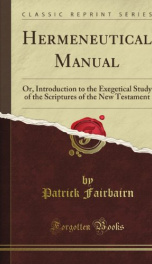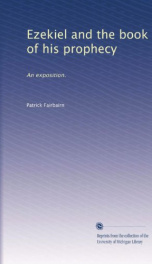hermeneutical manual or introduction to the exegetical study of the scriptures

In the more exact and scientific study of the Sacred Scriptures, the first object, in the order of nature, that calls for examination, has respect to the state of the original records. The possession of a pure text is an indispensable preliminary to a thoroughly correct and trustworthy exposition. And, aa well from its importance as from the peculiar character of the investigations belonging to it, this is now fitly assigned to a distinct branch of Biblical study. Next to it in order, and certainly not inferior in importance, is a correct and discriminating acquaintance with the original language of Scripture, and the principles that should guide our inquiries into its meaning and purport. All theology that is really sound, and that will stand the test of time, must have its foundation here. The reformers, to their credit, clearly perceived this, and were hence led to doctrinal results, which, in the main, never have been, and never can be displaced. They proceeded on the sound maxim oTable of Contents DISCUSSION OF TACTS AND PRINCIPLES BEARING ON THE LANGUAGE AND INTERPRETATION OP NEW TESTAMENT SCRIPTURE; Page; Section First-The Original Language of the New Testament, 13; Section Second-The Characteristics of New Testament Greek, 25; Deviation from classic purity, p 25-31 ; its basis in the later common dialect, p 31-37; its Hebraistic impress, p 37-45; mis-lakes made respecting this, p 45-54; impress derived from new relations and ideas, p G4-G1; Section Third,-Collateral Sources for determining the Sense, and; explaining the Peculiarities of New Testament Scripture, 61; Wriliugs of Pbilo and Josephus, p 62-66; Jewish Rabbinical writings, p 6G-70; ancient versions, p 70-74; early leathers, p 74-78; Books of Antiquities, etc, p 78, 7!); Suction Fourth-General Rules and Principles to be followed in the; Interpretation of Particular Words and Passages, 79; Section Fifth-Of False and True Accommodation; or the
Info about the book
Author:
Series:
Unknown
ISBN:
0310228328
Rating:
4/5 (3)Your rating:
0/5
Languge:
English
Users who have this book
Users who want this book
What readers are saying
What do you think? Write your own comment on this book!
write a commentif you like hermeneutical manual or introduction to the exegetical study of the scriptures try:
Do you want to exchange books? It’s EASY!
Get registered and find other users who want to give their favourite books to good hands!



